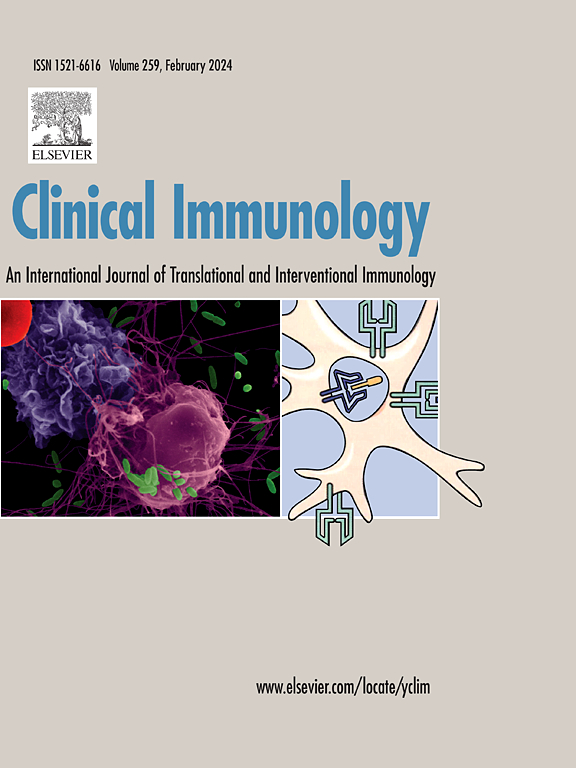A randomised, placebo-controlled, phase III trial of leniolisib in activated phosphoinositide 3-kinase delta (PI3Kδ) syndrome (APDS): Adolescent and adult subgroup analysis
IF 3.8
3区 医学
Q2 IMMUNOLOGY
引用次数: 0
Abstract
Activated phosphoinositide 3-kinase delta (PI3Kδ) syndrome (APDS) is an ultra-rare, progressive genetic disease, characterised by immune deficiency and dysregulation, affecting individuals from birth. In a 12-week phase III randomised placebo-controlled trial, leniolisib, a selective PI3Kδ inhibitor, was well-tolerated and met both co-primary endpoints (change from Baseline in log10-transformed sum of product of diameters of index lymph nodes and percentage of naïve/total B cells at Day 85). Here, prespecified subgroup analyses are reported in adolescents aged 12–17 years (leniolisib, n = 8; placebo, n = 4) and adults aged ≥18 (leniolisib, n = 13; placebo, n = 6). In both subgroups, leniolisib reduced lymphadenopathy (least squares mean change versus placebo: adolescents, −0.4 versus −0.1; adults, −0.3 versus 0.1) and increased the percentage of naïve B cells (least squares mean change: adolescents, 44.5 versus −16.5; adults, 28.4 versus −1.1). Leniolisib was well-tolerated in both adolescents and adults. These results show leniolisib is an effective APDS treatment in both subpopulations.
Plain Language Summary
What is activated PI3Kδ syndrome (APDS)?
APDS is an ultra-rare disease in which the immune system does not work correctly. People with APDS have a wide range of symptoms, including infections, certain organs associated with the immune system becoming larger, and worse quality of life. These symptoms generally start in childhood.
Why was this study carried out?
Current treatments only treat the symptoms of APDS, rather than correcting the cause of the problem. These treatments can also have significant side effects. A new medication for APDS called leniolisib aims to treat the underlying cause of the disease. This publication reports results from a clinical trial of leniolisib which compared patients who received leniolisib with patients who received a placebo. The aim of this report was to examine these clinical trial results to understand if leniolisib is effective and safe when treating both adolescents (12–17 years old) and adults (18 years and older) with APDS.
What were the results of this study?
Leniolisib improved the number of certain immune cells, compared to patients who did not receive leniolisib, in both adolescents and adults with APDS. Leniolisib also reduced the size of the enlarged immune system organs in both adolescents and adults with APDS. There were no major safety concerns for either age group who received leniolisib.
What do these results mean?
These results show that leniolisib can help the immune system to work in a way that is closer to those without APDS. This new treatment is effective and generally well-tolerated for both adolescents and adults. These results indicate that people with APDS are able to start treatment with leniolisib during adolescence, which may slow the build-up of symptoms and may also have a positive impact on the quality of their lives.
来尼利西布治疗活化磷酸肌醇 3- 激酶δ(PI3Kδ)综合征(APDS)的随机、安慰剂对照 III 期试验:青少年和成人亚组分析。
活化磷酸肌酸 3-激酶δ(PI3Kδ)综合征(APDS)是一种超罕见的进行性遗传病,以免疫缺陷和免疫调节失调为特征,患者从出生起就会受到影响。在一项为期12周的III期随机安慰剂对照试验中,选择性PI3Kδ抑制剂来尼利西布的耐受性良好,并达到了两个共同主要终点(第85天时指数淋巴结直径乘积之和的对数10转换后与基线相比的变化以及幼稚/总B细胞的百分比)。本文报告了12-17岁青少年(来诺利西布,n = 8;安慰剂,n = 4)和≥18岁成人(来诺利西布,n = 13;安慰剂,n = 6)的预设亚组分析。在这两个亚组中,来尼利替尼均减轻了淋巴结病(与安慰剂相比的最小二乘法平均变化:青少年为-0.4对-0.1;成人为-0.3对0.1),并增加了幼稚B细胞的百分比(与安慰剂相比的最小二乘法平均变化:青少年为44.5对-16.5;成人为28.4对-1.1)。来尼利西对青少年和成人的耐受性都很好。这些结果表明,来尼利替尼对这两个亚人群都是一种有效的APDS治疗方法。
本文章由计算机程序翻译,如有差异,请以英文原文为准。
求助全文
约1分钟内获得全文
求助全文
来源期刊

Clinical immunology
医学-免疫学
CiteScore
12.30
自引率
1.20%
发文量
212
审稿时长
34 days
期刊介绍:
Clinical Immunology publishes original research delving into the molecular and cellular foundations of immunological diseases. Additionally, the journal includes reviews covering timely subjects in basic immunology, along with case reports and letters to the editor.
 求助内容:
求助内容: 应助结果提醒方式:
应助结果提醒方式:


